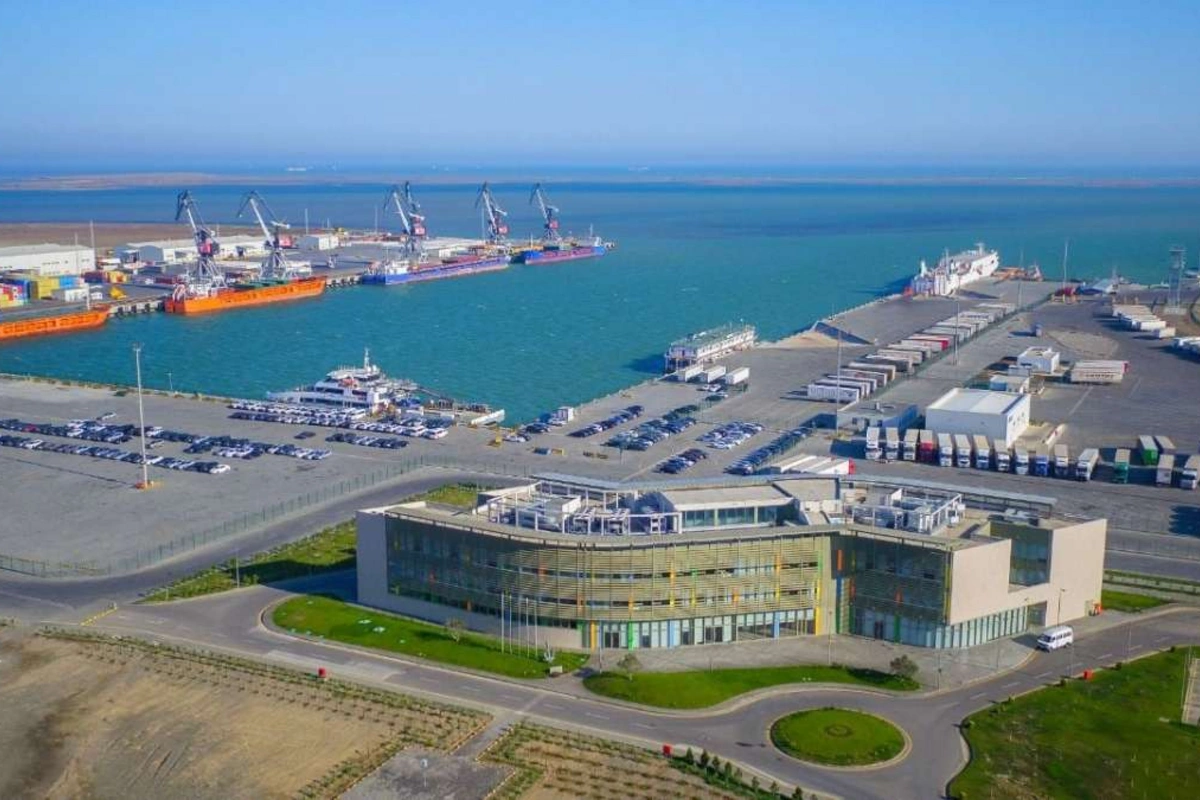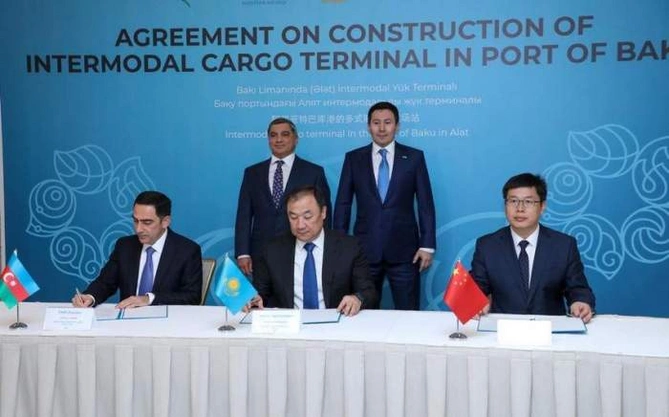
A key component of the project involves the construction of a universal freight yard, a covered warehouse complex spanning 5,000 square meters, and a container yard capable of accommodating over 1,000 containers which will allow the processing of a substantially higher volume of cargo, including goods from China and Kazakhstan, which will be transported via upgraded routes.
Baku port expansion to drive regional growth. Credit: businesslend.com
At the 29th UN Climate Change Conference in Baku, a historic agreement was signed, marking a new phase in the development of transport infrastructure in the region. The document concerns the implementation of a large-scale project to create an intermodal freight terminal at the Baku International Sea Trade Port in Alat. The signatories included Taleh Ziyadov, Director-General of the Baku Port; Nurlan Sauranbayev, Chairman of the Board of Kazakhstan Railways; and Yuan Xiaojun, Director-General of Xi'an Free Trade Port Construction and Operation Co., Ltd. The signing ceremony was attended by Ruslan Alihanov, Director-General of the Azerbaijan Investment Holding, and Nurlan Zhakuov, Chairman of the Board of Samruk-Kazyna JSC.
This project represents a significant step forward in enhancing the region's logistics capabilities. The new intermodal terminal will serve as a vital link in the transport chain connecting China, Central Asia, and Europe. Its creation will significantly boost the cargo handling capacity of the Baku Port. The terminal will be constructed on a 40-hectare site and will integrate multiple modes of transportation—sea, rail, and road. This approach will provide unprecedented flexibility and efficiency in freight transport, enabling adaptation to various economic and logistical challenges.
A key component of the project involves the construction of a universal freight yard, a covered warehouse complex spanning 5,000 square meters, and a container yard capable of accommodating over 1,000 containers. This will allow the processing of a substantially higher volume of cargo, including goods from China and Kazakhstan, which will be transported via upgraded routes. It is already evident that the adoption of such modern technologies and infrastructural solutions will lead to a significant increase in cargo flows through the Baku Port, thereby enhancing its role in the global transport network.
The economic significance of the project cannot be overstated. Doubling the port’s throughput capacity—from 300 to 600 trains—is expected to act as a catalyst for creating new jobs both at the port itself and in related industries. This will have a positive impact on the regional economy, fostering the development of adjacent sectors, including construction, transportation, and services.

On 12 November 2024,Azerbaijan, China and Kazakhstan signed an agreement on the construction of an intermodal cargo terminal in the Port of Baku.
Kazakhstan, as one of the key participants in this project, is taking active steps to accelerate its implementation. Firstly, construction of double-track railways is underway on several segments, significantly increasing the throughput capacity of existing transport routes. Secondly, the digitization of document processing has become a priority, allowing for faster freight transport while minimizing bureaucratic delays. These measures are part of Kazakhstan’s strategic plan to double freight volumes within the framework of the project.
It is worth noting that this project is evolving against the backdrop of a shifting geopolitical landscape. European partners are increasingly interested in establishing new transport routes that bypass Russian territory. In light of current sanctions and political instability, the creation of such routes has gained particular urgency. The new corridor through Azerbaijan and Central Asia offers a reliable and efficient alternative to traditional routes that face logistical challenges, such as congestion in the Suez Canal.
A major advantage of this route is its ability to circumvent sanctions, making it especially attractive to EU countries and other participants in international trade. Additionally, the route provides an alternative to maritime transport, which has increasingly faced various risks and limitations. This is particularly important in the context of global logistics disruptions observed in recent years.
The development of infrastructure within this project will impact not only Azerbaijan, China, and Kazakhstan but also other countries in the region. For instance, China is actively financing the construction of railway lines in Kyrgyzstan and Uzbekistan. These projects will not only improve transport links within the region but also lay the groundwork for integrating Central Asia into the global economy. In the long term, this network will become a powerful transportation artery connecting East and West.
An important aspect is that the initiative is supported not only by the participating countries but also by international organizations. European countries have expressed their readiness to invest in developing routes that enhance their economic security and diversify supply chains. This interest stems from the need to ensure stable and uninterrupted trade flows, especially amid growing global challenges.
The new intermodal terminal at the Baku Port will not only serve as a logistics hub but also as a symbol of economic cooperation and regional integration. It unites the efforts of China, Kazakhstan, and Azerbaijan, laying the foundation for long-term partnerships. Given the scale of the project and its strategic importance, it can be confidently stated that it will become an exemplary model of successful collaboration within the framework of the "Belt and Road" initiative.
In conclusion, the creation of the intermodal terminal at the Baku Port is a significant step towards strengthening the region’s transport infrastructure and expanding its economic potential. The project opens new prospects for the countries of Central Asia and Europe by providing alternative routes for international trade. Its successful implementation will solidify the region’s position on the global stage and serve as a prime example of effective international cooperation.
Share on social media